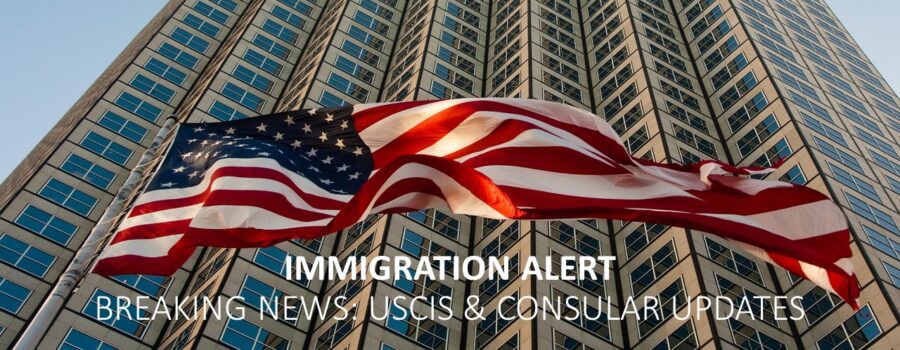Last Updated on April 9, 2023 by Anda Malescu
USCIS & CONSULAR UPDATES
- Effective June 2020 USCIS resumes premium processing for the following visa categories: E-2, E-1, L-1, O-1, TN Nafta Professionals, H-1B, H-2B, H-3, P, Q-1, R-1, EB-1, EB-2 and EB-3 after suspending premium processing on March 20, 2020 due to COVID-19
On June 1, 2020 USCIS begins accepting premium processing requests for EB-1, EB-2 and EB-3 visa applications (green card)
On June 8, 2020, USCIS begins accepting premium processing requests for H-1B applications filed before June 8, 2020 that are pending and are exempted from the quota, which includes H-1B employers that are cap-exempt, H-1B visa petitions for extension of existing H1-B, H1-B change of employer and H-1B petition amendments. The majority of employers are not cap-exempt as cap-exempt employers usually include universities, research institutions and non-profit organizations.
On June 8, 2020 USCIS is also scheduled to accept premium processing requests for visa petitions filed before June 8, 2020 and suspended due to COVID-19 in the following categories E-1, E-2 investor visa, L-1 visa, O-1 visa , H-2B visa, TN visa, H-3 visa, P, Q-1, R-1 visa.
On June 15, 2020, USCIS to start accepting premium processing requests for H-1B applications requesting premium processing concurrently with H-1B application filed on or after June 8, 2020 because the employer is cap-exempt (such as an institution of higher education, a nonprofit research organization or governmental organization) or the employee beneficiary is cap-exempt based on a Conrad or IGA waiver under INA section 214(l). Starting June 22, 2020 USCIS plans to restart premium processing for all other visa applications filed on or after June 8, 2020 including H-1B visa cap-subject (including for fiscal year 2021) and cap-subject H-1B petitions requesting a change of status from F-1 nonimmigrant status, H-2B, E-1, E-2, L-1, O-1, TN, H-3, P, Q-1 and R-1 visa. This applies also to those applicants who submitted their visa petition without premium processing request and would like to add the premium processing now.
- The Presidential Proclamation signed on May 24, 2020 by President Trump becomes effective at midnight on May 26, 2020 and adds Brazil to the list of countries that already have travel restrictions due to COVID-19 that apply to foreign nationals who have been in the restricted countries in the 14 days prior to their arrival in the U.S. The restricted countries includes the following as of May 26, 2020:
- Brazil (as of 11:59PM on May 26, 2020)
- The Schengen Area Countries (Austria, Belgium, Czech Republic, Denmark, Estonia, Finland, France, Germany, Greece, Hungary, Iceland, Italy, Latvia, Liechtenstein, Lithuania, Luxembourg, Malta, Netherlands, Norway, Poland, Portugal, Slovakia, Slovenia, Spain, Sweden, and Switzerland)
- UK
- Ireland
- Iran
- China
Please note that this travel ban does not apply to U.S. citizens, legal permanent residents, (generally) immediate family members of U.S. citizens, and other exempt individuals who are identified in the proclamations.
- The Executive Order signed by President Donald Trump and effective April 23, 2020, does not affect people who are in the United States with non-immigrant visas such as F1, H-1B, L1, E2, and other types of visas or those who want to enter the United States with nonimmigrant visas such as B1/B2, F1, J1, E2, L1, L2, O1, H visas and other nonimmigrant visas. In addition, individuals currently in the United States on nonimmigrant visas can still adjust status and seek an immigrant visa (green card). For example, L1 visa holders could apply for EB1-C, and H-1B, F1 or E2 visa holders could apply for EB-5, or any other method to obtain a green card.
Moreover, the Executive Order does not apply to EB-5 Investor Visa Program, where each investor is obligated to create 10 or more full-time positions
Finally, current green card holders, healthcare professionals whose function is to help fight against the pandemic, and spouses & children of US citizens who are under 21 years of age are all exempt from this order.
This Executive Order only limits entry to the United States to those individuals with immigrant intent (green card petitions). Parents of U.S. citizen petitioners are not exempted. The ban largely applies to all of the family-based preference categories, and EB-1 through EB-4.
- Foreign nationals currently in the United States of the following visas, F-1, F-2, F-3, M-1, M-2, M-3, J-1, J-2, Q, I, P-1, P-2, P-3, P-4, R-1, E-1, E-2, E-3, O-1, L-1, L-2, H-1B who cannot depart the country before their status expires can apply for Extension or Change of Status with USCIS.
- International students on F-1 visa currently experiencing financial hardship can apply for employment authorization (work permit) to work off-campus.
- US Consulates and Embassies worldwide to continue process H2 Visas. Due to COVID-19 pandemic all visa services at US Consulates and Embassies abroad were suspended starting March 20, 2020 with the exception of H2 Visas. This is because the H-2 program is essential to the economy and food security if the United States. In response to COVID-19 , consular officers at US Consulates and Embassies around the world, can, if they so choose, now waive the H-2 visa interview requirement for first-time and returning H-2 applicants who have no apparent ineligibility or potential ineligibility.
- USCIS will process applications for Employment Authorization Extensions, Form I-765, with previously submitted biometrics. Students on F-1 visa with pre or post-completion OPT, STEM, employed by qualifying international organization or experiencing severe economic hardship due to COVID-19 can apply for I-765, Employment authorization. Additionally, holders of J-2, M-1, A-1, A-2, G-1, G-3, G-4, NATO-1 through NATO-6, B-1, Spouse of E-1, E-2, E-3, L-1, H-1B and K-1, K-2, K-3 and K-4 visas, among others, can apply for extension of employment authorization, Form I-765.
- I-9 Employment eligibility verification requirements for companies remain in place. E-Verify remains available to employers affected by COVID-19, both directly through the E-Verify web portal and E-Verify employer agents.
- USCIS closing offices to the public March 18 through June 4, 2020 and cancelling immigrant interviews in response to the COVID-19 pandemic. USCIS will continue to perform duties that do not involve contact with the public. Local offices closed include, but are not limited, to Seattle, Los Angeles, Chicago and New York. USCIS will provide emergency services for limited situations.
HOW CAN WE HELP?
Malescu Law is committed to continue providing excellent client service. We are closely monitoring the COVID-19 pandemic and are committed to providing guidance and leadership on all immigration and business related issues as they arise.
Our offices will remain open and your calls will be answered Monday through Friday, 10am – 5pm.
If you have any questions, please contact us at 786-410-6841 or info@malescu.com.
Top updated Coronavirus Resources on Business and Immigration
COVID-19 Impact on commercial contracts and immigration, including E-2 and other visas
COVID-19 Business Loans and Disaster Relief Programs for businesses
COVID-19 Business Interruption Insurance Coverage
COVID-19 Impact on Employees on H-1B, E-1, E-2, L-1, O-1, TN visa and others
Malescu Law P.A. – Immigration Lawyers





